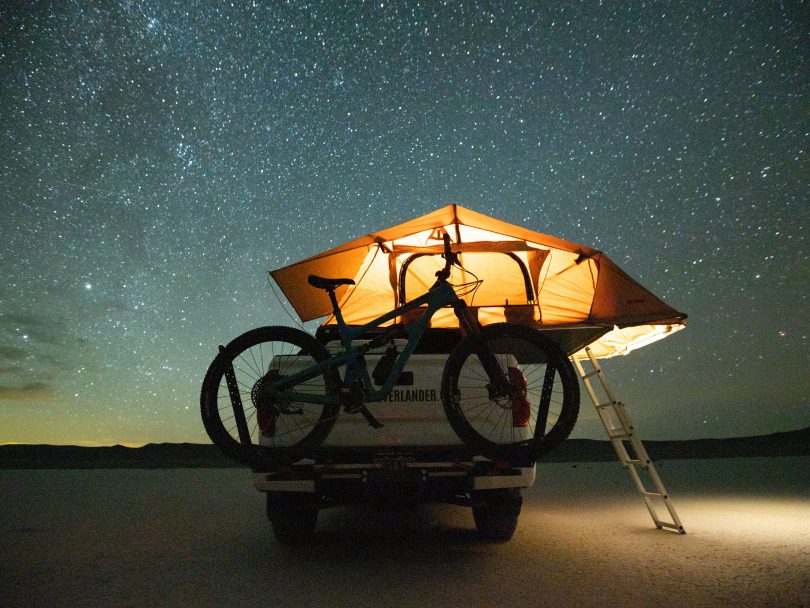By Eugene Buchanan –
Just after Gov. Jared Polis’ stay-at-home order lifted, Pat Drake and his family — including wife Isabel and kids Olivia, Cruz and Catalina — fired up their Toyota TRD Pro 4×4 and set off for a secret spot in the desert they call Glade Park somewhere near Colorado National Monument. Following weeks of self-isolating, this isolation — soaking up some sun, exploring rock formations, chasing lizards and gawking at the Milky Way galaxy around a crackling campfire — was a little more soulful. After a winter of ski patrolling at Snowmass and a month of keeping the kids from bouncing off the walls, the desert “glamping” was a much-needed reprieve.
And it was easier than ever for Drake thanks to the burgeoning craze of “overlanding” — going in style with all the creature comforts of home in a rig that can get you off the beaten track and back.
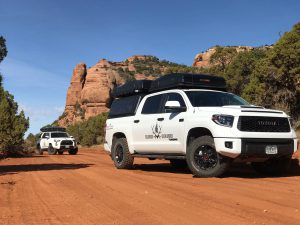
Hit the road and take a journey without the restrictions from traveling via car or RV. Overlanding is all out exploring the great outdoors. Photo courtesy of Colorado Overlander.
“It offers that feeling of freedom and a way to get out after being holed up for so long,” says Drake, who founded rental company Colorado Overlander in Glenwood Springs two years ago. “For us, it was just a great way to escape to the desert after the ski season. My family loves it. And I couldn’t think of a better place to do it than Colorado.”
Indeed, with the craziness of the coronavirus, many of us will be spending time closer to home this summer. But while we might be canceling trips to the Turks and Caicos, that doesn’t mean eating chips on the couch. As we begin spreading our wings again, exploring locally is more applicable — and sanity-saving — than ever, when and wherever regulations permit. And overlanding opens the car doors to a way of camping as perfect for families as it is for friends.
“It’s today’s nearest equivalent of embarking on the Santa Fe or Oregon trail,” Drake says. “Your wagon is your vehicle and the horses are under the hood. The hazards and goals might not equal those iconic migrations of the 1800s, but the sense of accomplishment and lessons learned do.”
According to Overlandjournal.com, overlanding is defined as “self-reliant overland travel to remote destinations where the journey is the principal goal.” It’s most often accomplished by mechanized off-highway transport — including bicycles, trucks, campers and SUVs — where the principal form of lodging is camping. Lengths can vary from days to weeks, months and even years. The common denominator is that the journey itself is the purpose, with the roads being the means and the end.
Without the stress of a goal, say as in climbing a mountain, overlanding lets you take in history, wildlife, culture, scenery and anything else that presents itself along the way. Beyond the camping, you can hike, mountain bike, fish, photograph, paddle, bird watch and more, all whenever and wherever you want. And with souped-up vehicles suited to the task, (like the logs you might cross on creeks), it bridges the gap between RVs — which let you camp but restrict you to paved sites — and regular cars, which make camping a chore.
To serve its growing devotees, in the past few years a veritable convoy of overlanding companies have cropped up making the pastime easier for weekend warriors. There are also websites, Facebook groups, blogs, chat rooms and more all dedicated to the craze, many with first-person accounts, GPS coordinates and even gear reviews.
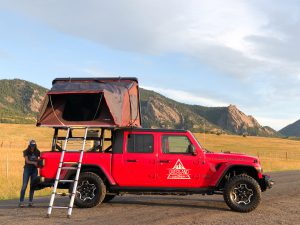
Overlanding vehicles come in a variety of sizes and styles, offering flexibility to those ready to explore. Photo courtesy of Overland Discovery.
Drake, who also runs river and bicycle outfitter Blue Sky Adventures out of Glenwood Springs, started his overland company last summer after realizing its off-pavement potential. “More and more people are doing it as a quick and easy escape into the wilderness from their normal lives,” says Drake, who rents four 4×4 TRD Pro Toyotas fitted with rooftop tents, outdoor camping equipment and more. “We saw a huge opportunity.”
While business slowed during the shutdown, he expects it to be rolling strong again soon. “I think there’ll be an uptick in bookings throughout the summer and fall,” he says. “We’re getting a lot of inquiries from people who want to get out, but stay closer to home.”
Others, he adds, are experienced out-of-state overlanders who don’t want to drive their own rigs across the country; they’d rather fly out and rent. And a growing percentage is newbies, whom Drake particularly enjoys outfitting. “I love seeing first-timers’ reaction when they come back,” he says. “You can tell that their experience was rewarding and refreshing and that they’ll be back for more.”
This interest has fueled several other overlanding startups as well. The husband-and-wife team of Eric and Camila Collier founded Overland Discovery in 2017 to also embrace the off-road rage.
“We started it after a trip to Moab and realizing how incredible it was,” Eric says. “We wanted to share that to help other people experience adventure in their own backyard, regardless of the equipment or vehicle they owned.”
Since then, the Colliers have branched out to offer all sorts of different vehicles, from smaller 4x4s to camper vans and compact RVs — all with the goal of easing the experience of exploring the outdoors. “We love the flexibility it offers,” Eric says. “It allows you to be spontaneous. Today’s pace of life is so fast and jam-packed with to-dos and checklists. Overlanding lets you break out of your day-to-day routine and explore without much planning — when you have a vehicle and everything you need to camp, you can focus on the experience.”
It also makes it easy to rally. With traditional camping, you have to pack, plan and make a checklist of everything you need. With overlanding, your vehicle is already equipped with everything from tent to stove. “All you have to do is decide where to go and what to do — the fun stuff,” he says. “On a Friday night after a long week of work, it’s easy to head somewhere over the weekend since your rig is all packed and ready to go.”
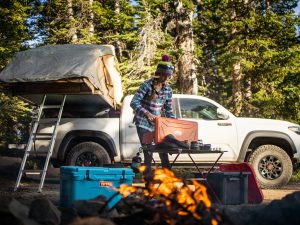
With rigs packed and ready to go, it’s easy to head out for time off the beaten path. Photo courtesy of Colorado Overlander.
All this has made it a burgeoning poster child of the camping market. Overland Journal, published five time per year, has 175,000 e-newsletter subscribers and more than 200,000 Instagram followers. And even though its fans are all looking to get off the beaten path, they are also eager to share what they know with other like-minded overlanders — from vernacular like RTTs (roof top tents) and tire tread width to GPS coordinates of places they’ve explored.
While its community is strong — and filled with tech nerds who love discussing their tricked-out rigs — overlanding appeals to novices. “There are definitely more beginners who want to get a taste of it,” Eric says. “There’s a whole new movement of people wanting to try it out.”
Beyond the Dr. Seuss-like slogan “Oh the Places You’ll Go” overlanding evokes, it also imparts valuable life lessons. Unlike full-on off-roading, says Drake, where the goal is often to conquer the trail at all cost, overlanding gives you a respect for the vehicle and the trail. “So you become mindful of land protection, trail etiquette and initiatives like ‘leave no trace,’ he says. “And as well as conveying lessons about the environment, it also helps you become more self-sustained and self-reliant, and confidently face the unknown. And it ties you into a great community of like-minded people.”
One such family epitomizing that community is Tennessee transplants and LifestyleOverland bloggers Kevin and Sarah McCuiston and their daughter Caroline. The couple fell in love with life on the road and in 2018 sold it all and struck out as full-time overlanders, piling their gear into a tricked-out Toyota Trail Edition 4Runner dubbed The Beast and documenting their exploits for a growing fan base on YouTube. Hauling a 2018 Turtleback Trailer filled with gear behind them, their adventures have taken them from the Gulf Coast to the Arctic Coast and a bevy of bumpy roads in between.
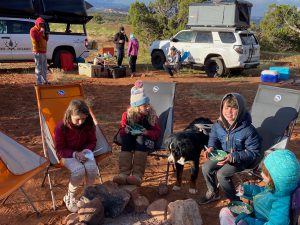
The overlanding experience is enjoyed by all lovers of the outdoors, young and old. Photo courtesy of Colorado Overlander.
“Growing up on farms, we’ve always loved spending time outdoors,” Kevin says. “So it was natural to go from road trips, hiking, hunting and car camping to what we now know as overlanding. We were already living the pastime, we just didn’t know there was a word for it.”
As with most other overlanders, the McCuistons are also big on “gearspeak,” their rig equipped with BFGoodrich KO2 tires, ICON Vehicle Dynamics suspension, Southern-Style Offroad bumpers, and a Gobi sport utility roof rack with a built-in tent. They’ve also helped pioneer a classic 800-mile overland route from New Mexico through Colorado dubbed the Enchanted Rockies Trail.
Outfitters like the Drakes and Colliers are hoping the overland craze continues to rub off on others also, even with COVID-19 curtailing Colorado travel.
“Because of the nature of the product and the experience it offers, we’re certainly hoping it’s business as usual even with today’s circumstances,” Eric says. “With people having been stuck at home, we foresee a high demand — it’s the perfect remedy for cabin fever.”
Steamboat Springs resident and Yampa Valley Electric consumer-member Eugene Buchanan has written about the outdoors for more than 25 years.

